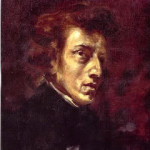Note: ‘superluminal’ is my new favorite word. 🙂
I usually have oatmeal for breakfast, but this morning I sank my teeth into pianist Yuja Wang‘s debut CD, Sonatas & Etudes, which has been GRAMMY®-nominated for Best Instrumental Soloist Performance (without Orchestra).
Here’s the track listing:
- Chopin: Piano Sonata No. 2 in B-flat minor op. 35 “Funeral March”
- Ligeti: Etude No. 4: Fanfares
- Scriabin: Piano Sonata No. 2 in G-sharp minor op. 19 “Sonata-Fantasy”
- Ligeti: Etude No. 10: The Sorcerer’s Apprentice
- Liszt: Piano Sonata in B minor
 Naughty little multi-tasker than I am, I loaded this disc into my laptop and listened through headphones while reading email and otherwise making my usual morning internet rounds. Chopin‘s Sonata provided a rather dramatic soundtrack for my Facebook friends’ status updates. (If one had unlimited time, finding just the right music to underscore the millions of tweet-length literary gems that course through the interwebs each day could provide endless amusement!)
Naughty little multi-tasker than I am, I loaded this disc into my laptop and listened through headphones while reading email and otherwise making my usual morning internet rounds. Chopin‘s Sonata provided a rather dramatic soundtrack for my Facebook friends’ status updates. (If one had unlimited time, finding just the right music to underscore the millions of tweet-length literary gems that course through the interwebs each day could provide endless amusement!)
Click Mr. Readmore to jump down the wormhole!
Like most people, I don’t know the Chopin Sonata nearly as well as his other, more celebrated works. Except for the third movement, that is. The Funeral March, from whence the sonata gets its nickname, is immortal (heh). I believe I first heard that music in some Warner Brothers cartoon or other (maybe this one?), back in the last century. 😉
The first and second movements may lack the overabundance of pretty melody for which Chopin is known – although they’re not exactly the musical equivalent of ugly step-sisters, either – but the music has a harmonic urgency that I find compelling. “Chopin wrote so many perfect compositions,” Wang says in the CD liner notes, “but his Second Sonata is not perfect. And I really like its imperfection.” As a fan of the all things charmingly imperfect, I concur!
After losing myself in the famous funeral march movement (which would have been an appropriate accompaniment to paying bills online, but the Facebook vortex still had me enswirled), I was jostled back to full consciousness by a quick-as-the-wind perpetuum mobile-type of thing, and I thought to myself, “Is this still Chopin, or have we moved on to one of the Ligeti Etudes? Either way, I don’t think we’re in Kansas anymore!” But the brief movement ended with an unmistakably tonal cadence, punctuated not once, not twice, but three times with a B-flat minor chord. I knew that Ligeti, iconoclast though he may have been, wouldn’t have done a crazy thing like that!
The next track started with a repeated scale figure that was not quite in one key, not fully in the other, and I knew I was firmly in Ligetian territory. Yet the transition from 1839 to 1985 was disarmingly smooth.
Such is the genius of Wang’s recording: the connections drawn between and among this collection of piano works are at once familiar and fresh. The idea of digging a wormhole to transport us superluminally from a late work of Chopin to a late work of Ligeti hadn’t occurred to me before, but when I heard it I thought, “Well, of course!” Ligeti acknowledged the influence of Chopin on his piano etudes (along with Scarlatti, Schumann, and Debussy), but hearing the two composers side by side like that was a revelation.
Wang describes her programming choices in terms of contrast: the three big, juicy romantic sonatas by Chopin, Scriabin and Liszt, interspersed with the mathematical precision of the Ligeti Etudes. She calls the Scriabin “improvisatory… like a fantasy world,” and the Liszt, “like heaven or hell.” Ligeti, on the other hand, provides “little sparkles in between the bigger works.”
Fair enough; with a collection of works as rich as this one, we could do “compare and contrast” ’til the cows come home. What I find thrilling about this recording, though, is the thread of unity I hear throughout the music – a thread made crystal clear by the sublime fusion of technical clarity and musical sensitivity in Wang’s playing.
According to the liner notes, among the ideas Wang considered for her debut recording was a CD of encore pieces, to showcase her “flair for virtuosic transcriptions.” I’m so relieved that she didn’t go with that concept. This recording has no shortage of virtuosic flair, but it also makes a mature artistic statement that leaves me eager to see what this gifted 22-year-old will do next.




